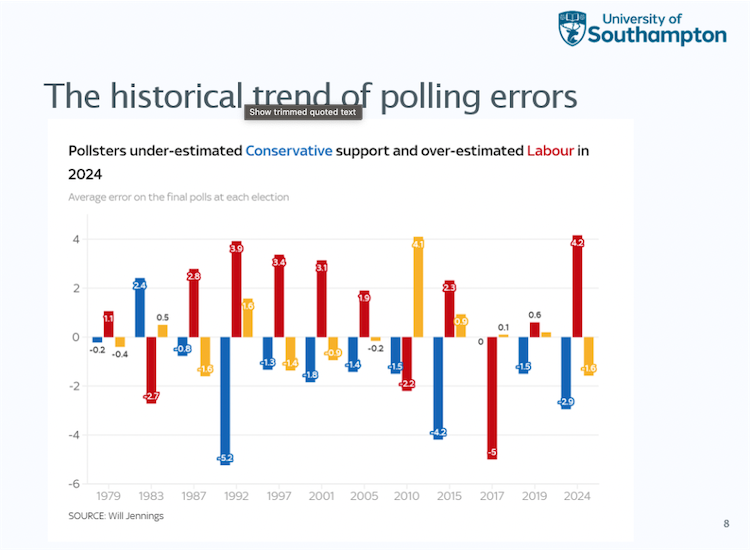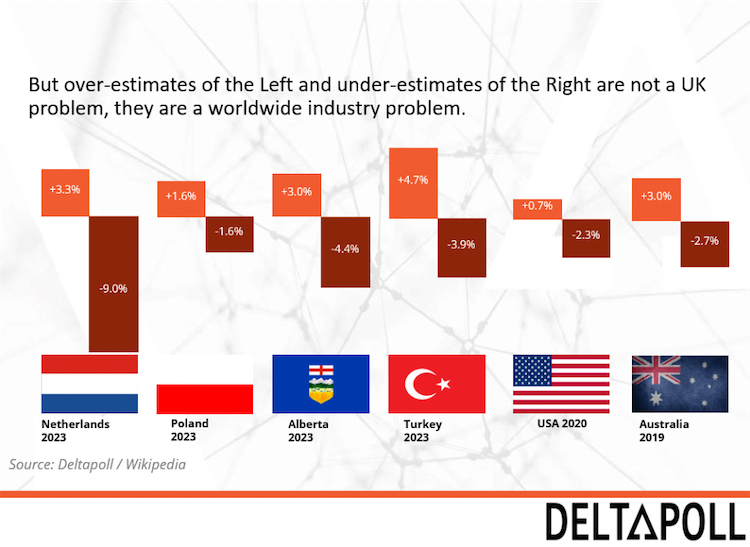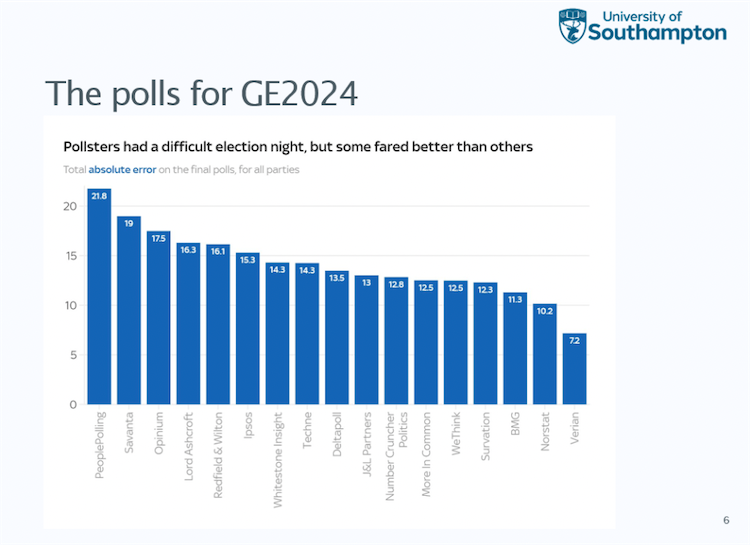Pollster Says There Is "Systematic" Bias In UK Election Polling Which Overstates Labour
Keir Starmer's Labour Party won a historic victory in this year's general election (Alamy)
4 min read
The co-founder of a leading polling company has said that there is "systematic" bias across the polling industry that led to the Labour Party being overstated in the run-up to the 2024 General Election, as well as in previous elections.
Martin Boon, Co-founder and Managing Director at polling company Deltapoll, joined Professor Will Jennings and Conservative peer and commentator Lord Robert Hayward on Wednesday at an event in Parliament to reflect on the 2024 General Election polling.
According to Jennings, Professor of Political Science and Public Policy at the University of Southampton, the election on 4 July was "not a great night" for UK pollsters.
 Graph showing the historical trend of polling errors in UK general elections (Professor Will Jennings, University of Southampton)
Graph showing the historical trend of polling errors in UK general elections (Professor Will Jennings, University of Southampton)
He pointed to the fact that the polling over-estimation of support for Labour in 2024 was the highest on record and the overall polling error of the margin between the Conservative Party and Labour was the worst since the 1992 election – when Neil Kinnock's Labour was widely expected to win but ended up losing to John Major's Conservatives.
Keir Starmer's Labour party won 33.7 per cent of the vote in July, ten per cent ahead of the Tories. This was enough to deliver a huge Labour majority in the First Past The Post electoral system. However, polls published in the days leading up to the election put Labour close to 40 per cent of the vote, and with a significantly larger lead over the Conservatives.
Boon admitted that the evidence pointed to not just a one-off error across polling, but "systematic" bias across polling in the UK and also in other countries.
 Graph showing over-estimates of votes for left-wing parties in different countries and regions (Deltapoll)
Graph showing over-estimates of votes for left-wing parties in different countries and regions (Deltapoll)
"Back in 2019 in Australia, the Australian Labor Party (a centre-left party) was predicted to win, not just by all of the final polls, but every single poll that was conducted a year out of the election bar one," he said.
"But of course, the centre-right party came through to take that election. So again, another example of polling error being shown in the same direction wherever you look.
"Now, that to me, as a pollster actually is more serious than error. That means bias. There's something systematic going on with polling methodologies, which is producing the same sort of problem time and time again."
However, he said that providing a solution to this would be "very tough", while Jennings added that there is "likely to be a combination of reinforcing factors" that sort of contribute to these errors going in a particular direction.
The panellists discussed how important it was for pollsters and the media to take a sensible approach, with Boon going as far to say that he would prefer to see fewer polls being reported.
 Graph comparing the absolute error by different pollsters in the 2024 UK General Election (Professor Will Jennings, University of Southampton)
Graph comparing the absolute error by different pollsters in the 2024 UK General Election (Professor Will Jennings, University of Southampton)
"It’s frankly got boring, and for me to say that, what must everybody else be thinking?," he said.
"But the problem is, there's essentially no bar to getting into political opinion polling. There's no cost disincentive, that's why you find 16 polling companies this time – when I started, there were four, and it's only going to get bigger, because market research companies see an easy PR hit.
"People like me have to go away, we have to act independently, we have to come up with solutions, because I don't believe my industry deserves another free pass. I think we have to get it right, otherwise there might not be a polling industry for much longer.
"The media has been kind for whatever reason, there are polling companies that still exist that perhaps don't deserve to… we always get let off."
The next question for pollsters will be how to most accurately predict the outcome of the Conservative leadership election.
Conservative peer and commentator Lord Robert Hayward said that he believed the chances of the polls being accurate in the leadership contest were "absolutely minuscule" given the errors in the General Election polling.
